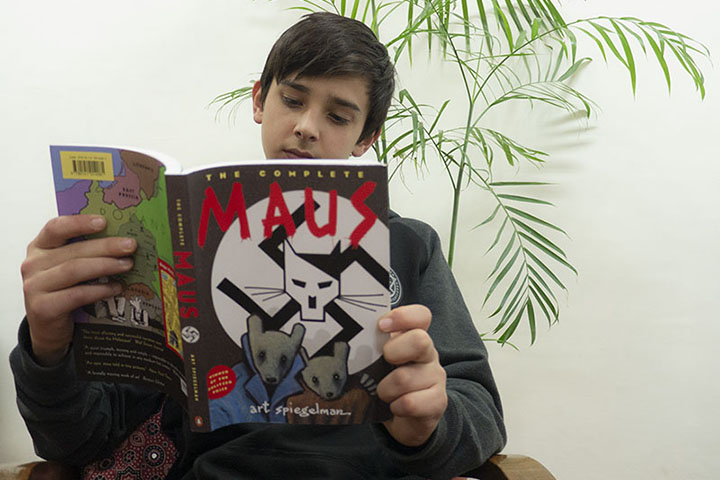
12 Dec One-Book Woodstock – Maus
One-Book Woodstock is back for the winter break. The idea is that everyone – students from Grades 6 up, teachers and staff – will read the book over the Christmas period. When we return in the Spring, the book’s themes will feed into our studies across the curriculum. Essentially, we’re turning the school into a giant book club, a shared reading and learning experience for everyone.
This year’s book, Maus by Art Spiegelman, is a graphic novel, but that doesn’t make it easy reading. The postmodern work depicts Spiegelman’s relationship with his father Vladek, a Polish Jew and survivor of Auschwitz, as they share his story of the Holocaust. Why have we chosen Maus for this year’s One-Book Woodstock? For one thing, the depths mankind is capable of sinking to is something that our students need to explore on their journey to global citizenship. To quote Spanish philosopher George Santayana, “Those who cannot remember the past are condemned to repeat it”.
As a graphic novel, the format is instantly more accessible for a wide age-range, which we hope will enable them to engage with this horrific chapter of history in a way that resonates with them on many levels. The multi-faceted nature of Maus is another reason it works as our One-Book Woodstock.
We have been collaborating with Dr Erick Gordon from the Teachers’ College at Columbia University to take a look at interdisciplinary project-based learning and he suggested this work as one that opens itself readily to interdisciplinary exploration. As a graphic novel, the book is in itself an interdisciplinary work, merging art and literature, and addressing challenging themes relevant to everything from history and politics to philosophy and ethics. This makes it possible to dovetail the themes in Maus across our academic curriculum.
Our Grade 11 English students, for instance, are studying Viktor Frankl’s Man’s Search got Meaning in their English classes, which is another Holocaust memoir. This Spring the focus for our advanced choir will be on music composed as a response to the Holocaust. Theory of Knowledge students are studying ethics when they return in February, and Maus touches almost all of the Global Contexts in the Middle Years Programme. At the end of this project, we aim to be able to publish a book sharing students’ work in response to Maus.
By undertaking this project, collectively consuming the book and learning from it, my hope is that we don’t only have our minds opened to the themes in the book, but are able to, in a very tangible way, demonstrate the power of interdisciplinary projects as a tool for learning.
Dr Craig Cook, Principal






ram nath
Posted at 17:16h, 18 Decembermerry christmas
Ankit Negi
Posted at 18:29h, 31 DecemberThis is the amazing post which I liked the most, Thanks for creating such good content!
Happy New Year!
Source: https://tractorguru.in/vst-tractors
Arshia
Posted at 14:43h, 02 JanuaryHappy New Year.